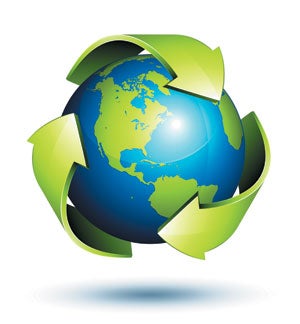
What do the numbers 500 million, 2 billion, 7.6 billion, and $6 billion have in common with the supply chain?
Give up?
Wood pallets.
Each year, we produce 500 million new wooden pallets and on any given day there are 2 billion wooden pallets in circulation. Approximately 7.6 billion board feet of lumber is used annually to build these pallets equating to $6 billion in annual sales for the lumber industry, building the pallets that are used for shipping, storage, and distribution within the supply chain.
These are HUGE numbers, ones that are difficult to even comprehend. Many of those pallets are not only designed for a single use, they're also full of nearly impossible to remove nails making recycling out of the question and filling up landfills. And the worst part is that there are innumerable ways to recycle them for usable products including, amongst other things, fuel pellets, building materials, mulch, and insulation.
Let’s consider some facts about wood pallets:
- Every year in the US, 1 million acres of trees are destroyed to manufacture and produce wooden pallets. It would take approximately 40 years to replenish those lost acres.
- Wooden pallets have become a major factor in out planet’s deforestation. Estimates show we lose 137 animal, plant, and insect species each day due to deforestation, equating to 50,000 species every single year. And according to the World Resource Institute, more than 80 percent of the earth’s natural forests have already been destroyed.
- 54% of wood pallets are used for only one shipment, and then either stored, burned or thrown away.
Supply chain sustainability
With sustainability becoming the big buzzword of business, many companies are starting to look for ways to be a part of that movement. Reduce, reuse, and recycle: the three Rs that are driving many new business decisions. Many big box stores are looking for alternative platforms for shipping, including aluminum and plastics.
One of the major companies to start the sustainable shipping movement was IKEA, the Swedish furniture manufacturer. They developed a product that they called the Loading Ledge, made of a strong, yet lightweight, polypropylene plastic. The devices were to be used as an alternative to wooden pallets, offering reduced transportation costs (the Loading Ledge weighs approximately 2lbs while traditional wooden pallets weigh close to 40lbs), as well as offering significant space savings by taking up dramatically less space than traditional pallets.
In 2012, IKEA decided that the program had been such a success in their warehouses and distribution facilities (they were on the way to completely phasing out traditional wooden pallets all together) that they wanted to introduce the idea to businesses around the world.
Thus in 2014, OptiLedge was introduced to the global marketplace. By utilizing the OptiLedge product instead of traditional pallets, customers can realize thousands in saving through reduced labor costs, as well as lower fuel expenses because of the significant decrease in weight. And one truckload of OptiLedges is equivalent to 23 truckloads of traditional pallets.
Best Buy has successfully used the OptiLedge system since the late 2000s. By shipping on the OptiLedge, they are able to realize supply chain savings on import products from Asia. The OptiLedge reduces labor, improves supply chain efficiency, and is an environmentally sustainable alternative to other shipping platforms.
Join the supply chain revolution
 Today, IPS Packaging has the capability to help you realize the same cost and space savings that many of the biggest retailers in the world are reaping. With the use of the OptiLedge system, your business can have a new and innovative way to reduce your transportation and labor costs while being able to boast your environmental contributions. The situation is a win-win: it just takes you reach out to learn more.
Today, IPS Packaging has the capability to help you realize the same cost and space savings that many of the biggest retailers in the world are reaping. With the use of the OptiLedge system, your business can have a new and innovative way to reduce your transportation and labor costs while being able to boast your environmental contributions. The situation is a win-win: it just takes you reach out to learn more.
sales@ipack.com | 800.277.7007





